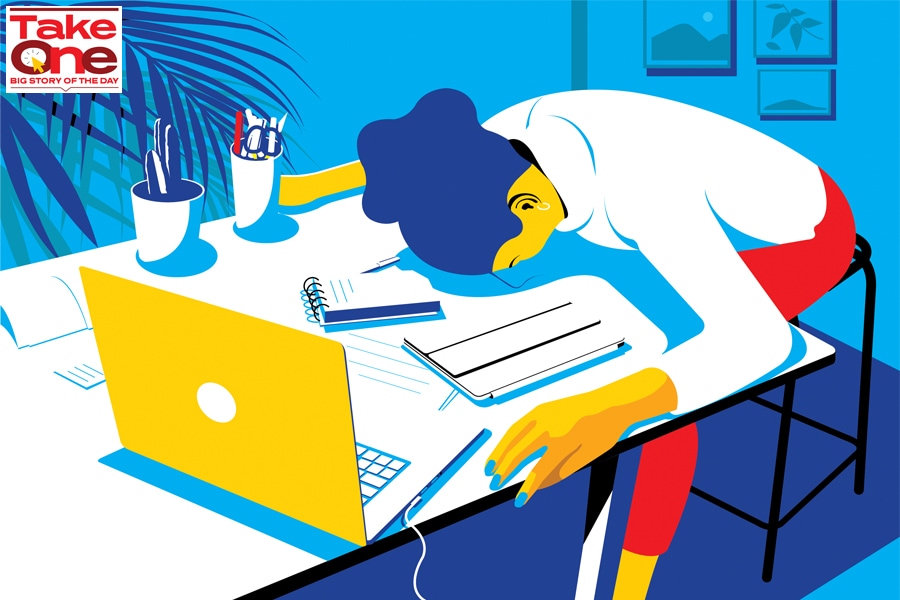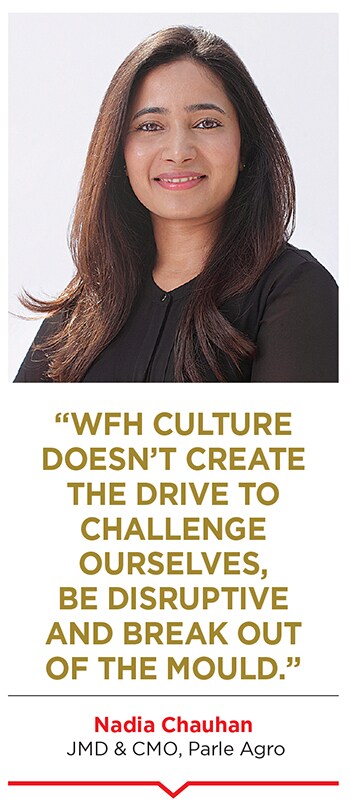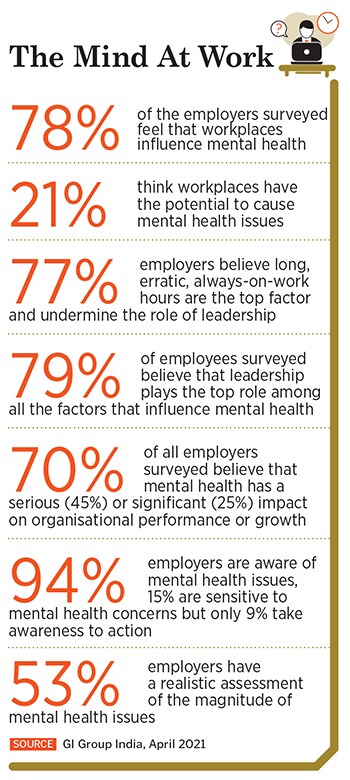Work from home: This future of work may not be sustainable
A year on, the model evokes survivor's guilt, productivity shame, lack of motivation and attention for some, while for employers, it's a situation far from ideal


 Illustration by Sameer Pawar[br]
Illustration by Sameer Pawar[br]
In March 2020, when the government announced a nationwide lockdown to contain the spread of Covid-19 and work from home became the norm, for some part of corporate India that hadn’t ever worked remotely, it was a blessing in disguise. It gave them the chance to work and spend time with their families, introspect, learn new things or pursue hobbies in the time they’d usually spend on commuting. For Sania Jagirdar (name changed on request), a 33-year-old Mumbai-based IT professional, it was all so new. After spending around 10 hours at work, she collaborated with an artist-friend to create art. “It gave me a sense of accomplishment, the likes on Instagram, the validation, that my life was not limited to work anymore," she says. “Art was comforting, but what made me the happiest was that I got time to spend time with my sister who was going to get married next year," she adds.
One year later, she, like many others, is still working from home. But, this time, nothing feels the same, she says. Ten-hour shifts have turned into 12 hours or more, there’s no time to create art, and her sister’s wedding keeps getting postponed for a time when the family will stop receiving calls informing that a relative has succumbed to the virus.
“Work from home is not a novel concept anymore. Like everything else, art also feels monotonous. There’s no respite from work and there’s nothing to look forward to," she says. “I had to seek professional help because I was having trouble sleeping, and would easily break out into sweats. I have now been diagnosed with anxiety," she adds.
Dr Sonal Anand, a consulting psychiatrist with Wockhardt Hospital, says cases like Jagirdar’s are a lot more in number this time around. In her experience, she says, “Calls for work-from-home related stress and anxiety have risen by about 30 percent compared to when we were in the first wave. While there’s no denying work hours and load have increased, people are also riddled with survivor’s guilt or productivity shame since the worst has hit closer home."
Further, unlike last year, when social media offered some solace, this time, they’re flooded with requests for help to keep people alive. “In that case, where do people go for a break? It takes a heavy toll and work from home is not easy anymore," she adds.
According to an April 2021 report by Gi Group India, a global staffing firm, 48 percent of the employees they surveyed recognised that Covid-19 had an impact on their mental wellness, but only 29 percent have actually taken steps to deal with them either online or offline.
“Working from home is complicated and easier said than done. Being in office places us away from family obligations and distractions, at least physically. It also provides us with some semblance of an organised structure in terms of proper schedule, fixed working hours, personal time, social interactions and family time," says Marcos Segador Arrebola, managing director, Gi Group India. “In a remote working scenario, employers also find it difficult to manage and keep people motivated because there is less opportunity to do so digitally without being face-to-face."
Under such circumstances, companies are continuously scrutinising and evaluating if work from home is sustainable in the long term.

For Parle Agro, while virtual meetings have been a revelation, saving the management significant costs and time, its employees are keen on getting back to campus and working from office, says Nadia Chauhan, joint managing director and chief marketing officer. “I wouldn’t look at continuing the work-from-home model infinitely, even though the flexibilities it offers do have their advantages and that’s something we’d like to retain," she says. “The collective energy, creativity and chemistry is difficult to replicate on a virtual platform. Our goal and vision is to be strikingly disruptive and the WFH culture doesn’t create the drive to challenge ourselves, be disruptive and break out of the mould. We miss being on premise together and we look forward to operating from our office," she says.
At Crompton Greaves Consumer Electrical Limited, all processes had been designed keeping in mind everyone’s physical presence. “No Crompton leader had ever worked before in a widespread work-from-home scenario," says Satyajit Mohanty, CHRO and vice-president. “While our productivity soared, all teams have overperformed, and employee engagement has reached an all-time high, we have realised that the social fabric of the organisation is not the same. It has impacted our work-life-balance, stress levels and mental well-being," he says. While the organisation has undertaken several cost-control initiatives, it has also redrawn strategies regarding workspace and working patterns. “For example, at the head office, we will be opting for a long-term flexible work-from-home arrangement where each employee would have one day a week to work from home. Our office spaces are also being radically redesigned," he adds.
Ecommerce giant Amazon says while they will continue to offer flexible working options, they would encourage physical presence and an in-office culture to be able to serve their customers better. “We are cognisant of the fact that a one-size-fits-all strategy will not work in a company like ours. We are flexible for our employees to continue working from home if their roles can be effectively done virtually. We will continue to monitor the situation closely and we shall plan for a safe and organised way to help employees return to office providing them sufficient time to make necessary arrangements on the personal front," says Deepti Varma, HR director corp -APAC & MENA, Amazon India.
Flipkart introduced a module that enabled employees to book seats when they need to come to work from the campus in small numbers, during non-lockdown periods. “We will continue to adapt to the changing external environment and establish flexible models that work best for our employees," says chief people officer Krishna Raghavan.
The experiences of the months gone by have given all stakeholders a clear grasp of the upsides and downsides of working from home. While it allows better flexibility to work, it also blurs personal and professional lives, in some cases impacting efficiency. Therefore, some are considering a part work from home, and part work from office, or a hybrid model.
“We are open to a hybrid model if that makes our employees happy, engaged and productive. Working from office is important for building the culture of an organisation in the long run," says Tapan Mishra, the founder of Seniority.

For employees like Arul Chandra (name changed), a hybrid model, if not a permanent work-from-office, comes as welcome news because it not only means that his productivity levels will become better, it might also help him take care of his mental health.
“Last year, concentration and productivity levels were much better, now it’s getting too much," says the 33-year-old Bengaluru-based banking professional. “Even on my days off I think about work, but when I’m at work, I can’t do anything because I’m constantly feeling anxious and stressed. At times, I’ve wanted to quit, but the fact that I at least have a job when others don’t stops me from doing it. I feel guilty about everything nowadays," he adds.
For many, work-from-home has been a boon and will continue to be a preferred choice in the long run. However, psychologists feel it could be detrimental to people’s mental health for many reasons.
“People have been living like this for a year without access to their usual coping mechanisms, like being able to go on a vacation, or a restaurant, gyms, parks or other forms of recreation. So, they may not feel a great sense of depression, or intense emotions, but the continued distress has impacted the ability to feel motivated on a daily basis," says Tanuja Babre, programme coordinator, iCALL, Tata Institute of Social Sciences.
What work from home does is that it takes away the ability in people to delineate between work and home. “The smallest of rituals, of getting ready, leaving for work, driving to office, and travelling back home that acted as indicators to signify that the workday is over helped understand the difference between the personal and professional life. All this is missing, so you also find yourself working on weekends because it’s better than watching the news and feeling sad. But subconsciously, it takes a heavy mental toll," adds Babre.
Therefore, while employers may be in the middle of decision-making about resuming operations from the premises, it is important for them to offer help in the meantime.
According to the GI Group’s study, while there are 1.1 million registered companies, only a 1,000 have employee assistance programmes (EAP). In Babre’s experience, she has seen a significant rise in the number of companies reaching out to her with an intention to start EAPs, but she feels just enlisting a helpline number or hiring a psychologist will not solve the problem of workplace mental health issues. Now more than ever, companies have to do something for prevention and intervention. They have to look to create a culture where talking about mental health problems is not considered a sign of weakness or held against an employee during their appraisal.
“There have been a lot of traumatic experiences, loss of jobs, relationships, support systems. Feelings of anxiety and overwhelming emotions have been generated out of these experiences. There has to be a safe space to process this and make meaning, especially out of grief or losses. The pandemic going away will not change what we feel internally but not addressing the emotional impact now will leave us with a heavy burden of mental health problems in the future," she says.
First Published: Jun 15, 2021, 14:00
Subscribe Now